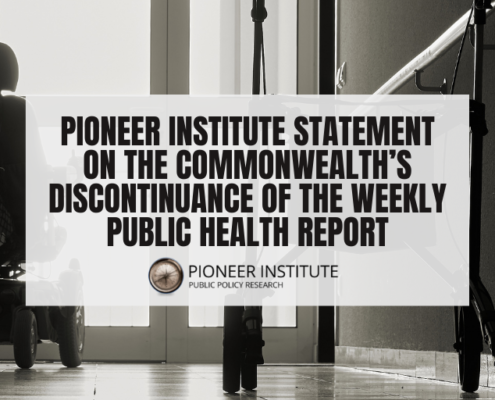A Bold New Agenda: Introducing Pioneer’s New Board Chair Adam Portnoy
/0 Comments/in Featured, News, Video /by Editorial StaffLast week, Pioneer Institute announced the appointment of Adam Portnoy, President and CEO of The RMR Group, as new Chair of our Board of Directors, succeeding Stephen D. Fantone, who recently stepped down after eight years of dedicated service. We are excited about this new stage in Pioneer’s development, and want to introduce Adam to all of you, our supporters.
In the video below, Adam shares thoughts on what inspired him to become more involved in Pioneer’s work, highlighting the Institute’s data-driven, forward-focused approach to advancing policy solutions and creating more opportunities for all. He also offers his vision for the future, building our community of supporters and increasing our public interest law activities to strengthen our policy impact – which is the core of the Institute’s new Pioneer2024 strategic plan. We hope you enjoy this chance to get to know Adam and hear his message!
Join us as we embark on this ambitious new agenda! Learn about membership opportunities.
Stay Connected!

Virtual Learning Grows During COVID

Pioneer Institute Files Amicus Curiae Brief in U.S. Supreme Court School Choice Case

The Promise and Challenges of Rare Cancer Treatments

Public Statement on Massachusetts High Technology Council’s Challenge to the Graduated Income Tax Ballot Language

Study: “Millionaire’s Tax” Would Have Far-Reaching Effects on “Pass-Through” Businesses

Study: Decline in Cardiovascular Health Screenings During COVID-19 Pandemic Poses New Public Health Threat

Study: Pandemic Pension Bonus Bills Would Cost Billions and Unfairly Favor Highly Compensated Public Employees

Study Warns that New Hampshire Tax Policies Would Exacerbate Impacts of a Graduated Income Tax

Pioneer Applauds MassDOT for Allston Project All At-Grade Plan

Study: After Years of Steady Increases, Homeschooling Enrollment Rose Dramatically During COVID

Study Finds SALT Deduction Cap, Graduated Income Tax Will Combine to More Than Double Tax Burden on Some Households




